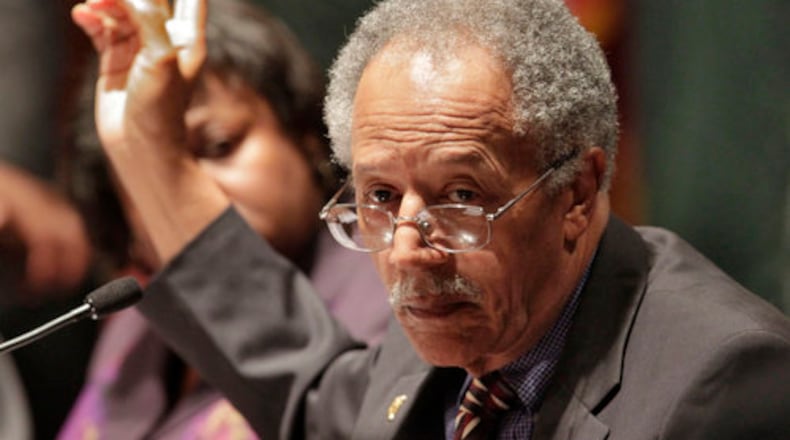Former Atlanta City Council member Clarence Terrell “C.T.” Martin, known as the “Dean” of the council and often credited with helping integrate some of Atlanta’s most segregated neighborhoods, died Saturday.
Martin, who was surrounded by his family at his home in southwest Atlanta, was 84 years old. His family did not immediately release the cause of death.
Martin earned the moniker “Dean” because of his long tenure on the council. He represented Atlanta’s District 10 for nearly 30 years. Martin first ran for a seat on the City Council in 1990 after Ira Jackson stepped down to become Mayor Maynard H. Jackson’s aviation commissioner.
Martin — who had also worked for Maynard Jackson, the city’s first African American mayor — defeated eight opponents in the race for the District 10 seat and held it until 2017 when he ran in a failed bid for City Council president.
“Councilmember C.T. Martin was a mentor and a friend,” said Mayor Keisha Lance Bottoms in a statement. “He was my seat mate for eight years on City Council and his lessons of leadership remain with me today. He was a fierce voice for the voiceless and above all else, placed the needs of our communities first.”
City Council member Michael Julian Bond said Martin was instrumental in helping integrate the neighborhoods around Atlanta’s Peyton Road, the site of the city’s so-called “Berlin Wall” during the early 1960s.
At the time, the area was undergoing a racial transition that made some white residents uneasy. A pressured Mayor Ivan Allen Jr. ordered barricades built to dissuade black citizens from purchasing homes in an all-white neighborhood. A court would rule the barricades unconstitutional, and Allen immediately pulled them down.
Bond said that Martin moved into the area and his daughter was among the initial wave of students to integrate the schools.
Public safety was one of Martin’s chief concerns while on the council and he chaired the council’s public safety committee several times.
In more recent years, Martin was a close ally to Mayor Kasim Reed during his tenure and sponsored some of Reed’s key transportation initiatives.
Martin earned the endorsement of the late U. S. congressman and civil rights icon John Lewis in Martin’s bid for council president in 2017 but failed to earn a spot in the runoff.
Council President Felicia Moore, who is now running for mayor, won the seat.
“He established his own unique footprint during the civil rights era and managed to further extend his leadership as an elected official with significant influence,” Moore said. “C.T. Martin was a man of great resolve who cared deeply about the welfare of his constituents and advancing the collective experience of the African American community.”
When Martin left office in 2017, the city of Atlanta renamed the $27 million Adamsville Recreation Center to the C.T. Martin Natatorium and Recreation Center as a tribute to his many decades of service.
A longtime advocate for the Southside, Martin fought to include the designation of Martin Luther King Jr. Drive as a priority in the city’s master redevelopment plan. He also helped lead the effort to rename Atlanta Hartsfield-Jackson Airport in honor of Jackson.
The Atlanta native was a graduate of Booker T. Washington High School, and earned a bachelor’s degree from Shaw University and master’s degree from Atlanta University.
Bond said that over the years Martin was frequently sought out for his intimate knowledge of Atlanta.
“He was an insightful and a private adviser to many people in and out of politics,” Bond said.
Martin is survived by four children and five grandchildren.
About the Author
Keep Reading
The Latest
Featured


